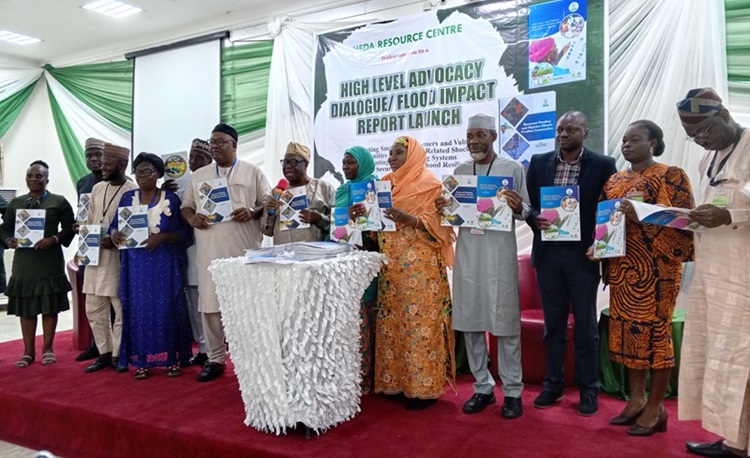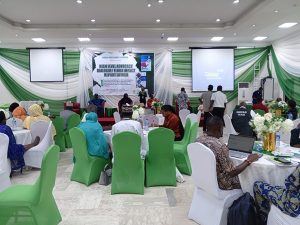
The Climate and Sustainable Development Network (CSDevNet) joined a diverse group of stakeholders, including civil society organizations (CSOs), community-based organizations (CBOs), academia, government representatives, farmers, agricultural and climate change experts, and media professionals, at the High-Level Advocacy Dialogue and Flood Impact Report Launch.
The event, themed “Protecting Smallholder Farmers and Vulnerable Communities from Climate-Related Shocks: Implementing Early Warning Systems for Food Security and Livelihood Resilience in Nigeria,” was organized by HEDA Resource Centre and took place on Wednesday, August 28, 2024, in Abuja.
The workshop underscored the critical role of mobile technology and media in fostering climate-resilient agriculture and inclusive climate action, particularly in light of the severe impacts of extreme weather events, such as flooding and drought, on food production, women, and People Living with Disabilities (PWDs) in Nigeria.
Giving his opening remarks, the Executive Secretary of HEDA Resource Centre, Sulaimon Arigbabu, emphasized the timeliness of the theme, given the increasing climate risks that heighten the need for robust, culturally relevant Early Warning Systems (EWS).
“Today’s event is part of our broader efforts under the African Activists for Climate Justice Project, a five-year Pan-African initiative funded by the Netherlands’ Ministry of Foreign Affairs,” Arigbabu stated.
Early Warning Systems (EWS) were defined as the set of capacities required to generate and disseminate timely and meaningful climate-related information, enabling individuals, communities, and organizations threatened by hazards to take proactive and swift actions to minimize harm or losses.
Arigbabu explained that EWS are crucial in providing actionable information that empowers farmers and communities to anticipate, prepare for, and mitigate the impacts of climate-induced disasters, such as floods and droughts. He highlighted the event’s aim to evaluate the current state of EWS in Nigeria, identify coverage gaps, and assess their accessibility and effectiveness, especially for smallholder farmers.
“Our mission is to shift from merely expressing condolences after climate-induced disasters to proactively communicating warnings and knowledge that build resilience in our vulnerable communities,” he added.
During the first panel discussion, moderated by Professor James Jayeoba of Sustainable Agriculture at Nasarawa State University, the panelists explored the theme “Leveraging Mobile Technology for Climate-Resilient Agriculture in Nigeria.”
Dr. Abdulwarees Solanke, a media practitioner, emphasized the need for the media to profile farmers in rural communities and assess the extent of media technology available to them. By doing so, the media can more effectively deliver climate services to smallholder farmers, in collaboration with relevant researchers in the country.
“The use of radio to disseminate agricultural information is crucial. Almost every radio station in the country has programs focused on environmental and agricultural issues,” Solanke noted. He urged stakeholders in the agricultural sector to identify and utilize free radio programs that can be leveraged to disseminate vital information to farmers.
Rahmah Aderinoye, Chief Executive Officer of Rashak Farms Agri-Allied Limited, highlighted that cultural barriers and a lack of inclusivity hinder women farmers from easily accessing climate risk information.
“Cultural barriers often prevent women from participating in training programs. This is why we prioritize women and PWDs in our outreach efforts,” Aderinoye said. She stressed the importance of supporting women farmers by providing them with the necessary resources, as the agricultural sector is predominantly male.

One way to support women farmers, Aderinoye suggested, is by ensuring that weather forecast information is delivered to them promptly through mobile devices.
Adetoro Akindele, Vice President of Commercial at Thrive Agric, emphasized the potential of social media in disseminating climate-related information to farmers across the country.
“Short video clips, or reels, are highly effective in spreading information, and they are not gender-biased,” he remarked. Akindele pointed out that in some communities, women are culturally restricted from making direct eye contact with men, leading to their disenfranchisement. He called for empowering women by providing them with reliable and timely information.
Akindele also advocated for engaging telecommunication companies to facilitate the widespread dissemination of relevant climate risk information to farmers nationwide.
In a quick intervention, Yusuf Kelani, an aide to President Bola Tinubu on Climate Change Matters, revealed that the government is working towards developing a climate alert system to ensure everyone within Nigeria’s borders is included.
“The government is considering sending early warning system information to everyone in the country via their mobile phones,” Kelani announced.
The High-Level Advocacy Dialogue/Flood Impact Report Launch highlighted the urgent need for effective and inclusive Early Warning Systems to protect smallholder farmers and vulnerable communities from climate-related shocks in Nigeria.
The event brought together diverse stakeholders to discuss innovative solutions, particularly the role of mobile technology and media, in enhancing climate resilience. The discussions underscored the importance of empowering women farmers and leveraging existing communication platforms to disseminate critical information.
The event served as a significant step toward building a robust climate alert system in Nigeria, with the potential to significantly improve food security and livelihood resilience in the face of escalating climate risks. As efforts continue, the outcomes of this dialogue are expected to shape future policies and interventions, ultimately contributing to a more resilient agricultural sector in Nigeria.
